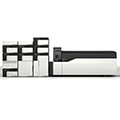 |
|
| The LCGC Blog |
|
|

|
Forensics, Lawyers, and Method Validation—Surprising Knowledge Gaps
For the analytical community, method validation in some form or another is a natural extension of best practice in the analytical laboratory. However, the notion of method validation, and many aspects of detailed forensics analysis, are not well understood by most lawyers and judges. |
|
| LCGC TV |
 |
Factors to Consider when Developing a 2D LC Method
Comprehensive liquid chromatography (LC) is a multidimensional technique that has the potential to increase peak capacity resolution when separating complex mixtures, especially in food analysis.
Luigi Mondello from the University of Messina, Italy, gives his advice for chromatographers who want to develop 2D LC methods. |
|
| Agilent eSeminar Series: Advance The LC Characterization of Biotherapeutics. |
Topic include:
• characterization of monoclonal antibodies (mAbs) and other proteins
• analysis of intact proteins, primary structure and post-translational modifications (PTMs)
• aggregation with SEC
• charged variants with IEX
• cleaved glycan analysis by hydrophilic interaction chromatography (HILIC)
 Learn more and register Learn more and register |
|
| Featured Article |
|
| Micro-SPE Desalting With Reduced Losses |
New! Micro-volume TARGA® C18 SPE chemistries to desalt peptide, glycopeptide or glycan samples. Desalting with the water wettable, TARGA® C18 UltraMicroSpin™ columns, by loading in 100% water, improves recovery of these polar molecules prior to LCMS. Try our TARGA C18 as your desalting protocol, today! The Nest Group, Inc. - “Not Just Columns ... Answers!”
 Learn more Learn more
|
|
| Featured News |

Photo Credit: Dwight Nadig/Getty Images
|
Identifying Fracking Contamination of Drinking Water Using GCxGC–TOF-MS
Scientists in Pennsylvania investigating an isolated contamination incident have published data from their study, demonstrating the application of comprehensive 2D gas chromatography coupled with time-of-flight mass spectrometry (GC×GC–TOF-MS) to investigate fracking contamination in a drinking water source.
|
|

Photo Credit: Ruth Jenkinson/SPL/Getty Images
|
Parabens Detected in Plastic Teething Toys
Parabens are commonly used in cosmetics and personal care products to protect against microbial growth, but a new study suggests that manufacturers may also be using parabens in plastic teething products designed for infants.
|
|
| Columns from Benson Polymeric |
Benson Polymeric offers a wide variety of columns for the analysis of carbohydrates and organic acids. All of our columns are packed with Sulfonated Poly(Styrene-Divinylbenzene), specifically designed to maximize your separation needs. Utilizing simple eluents (water for carbohydrate analysis, and dilute acid for organic acids analysis), Benson Polymeric columns offer an inexpensive and environmentally friendly alternative to reverse phase columns. .
 Learn more Learn more
|
|
| Featured Products |
 |
 |
 |
| LC-MS grade solvents |
The First SEC-MALS detector for UHPLC |
On-Line SFE-SFC System |
EMD Millipore’s LiChrosolv® hypergrade solvents are optimized and quality-tested for use in LC-MS applications. Due to their low level of ionic background and low ion suppression, LiChrosolv® hypergrade solvents ensure high reproducibility and high ionization efficiency in all LC-MS ionization methods.
 Learn More Learn More |
The µDAWN™ is the world's first multi-angle light scattering (MALS) detector that can be coupled to any UHPLC system in order to determine absolute molecular weights and sizes of polymers, peptides, and proteins.
 Learn More Learn More |
Combining on-line SFE and SFC in a single flow path, Shimadzu’s unique Nexera UC enables automatic extraction of up to 48 solid samples followed by seamless transfer to SFC/MS.
 Learn More Learn More |
|
| BIOshell Glycan HPLC Columns |
BIOshell™ Glycan HPLC columns, available from Supelco, are specifically engineered to deliver fast, reproducible glycan identification using HILIC chromatography. According to the company, the Fused-Core® columns provide improved resolution when compared to conventional LC methods thus allowing more reliable quantitation and confident identification of glycans. For more information or to request an evaluation column,
 Please Visit Please Visit
|
|
|
|
|
|
|
|
|
New Webcasts
MAb Charge Heterogeneity Analysis by CZE Series
Part 1: Thursday, 18 June 2015 — Results of an Intercompany Robustness Study
7 am PDT, 10 am EDT, 16:00 CEST
Part 2: June 30, 2015 — A Case Study from Merck Sharp & Dohme
7 am PST, 10 am EDT, 16:00 CET
Part 3: July 2, 2015 — A Test Method Fit for QC Testing
07:00 PST, 10:00 EDT 16:00 CEST
|
On Demand Webcasts
|
|
 |
|
|
|
|
|